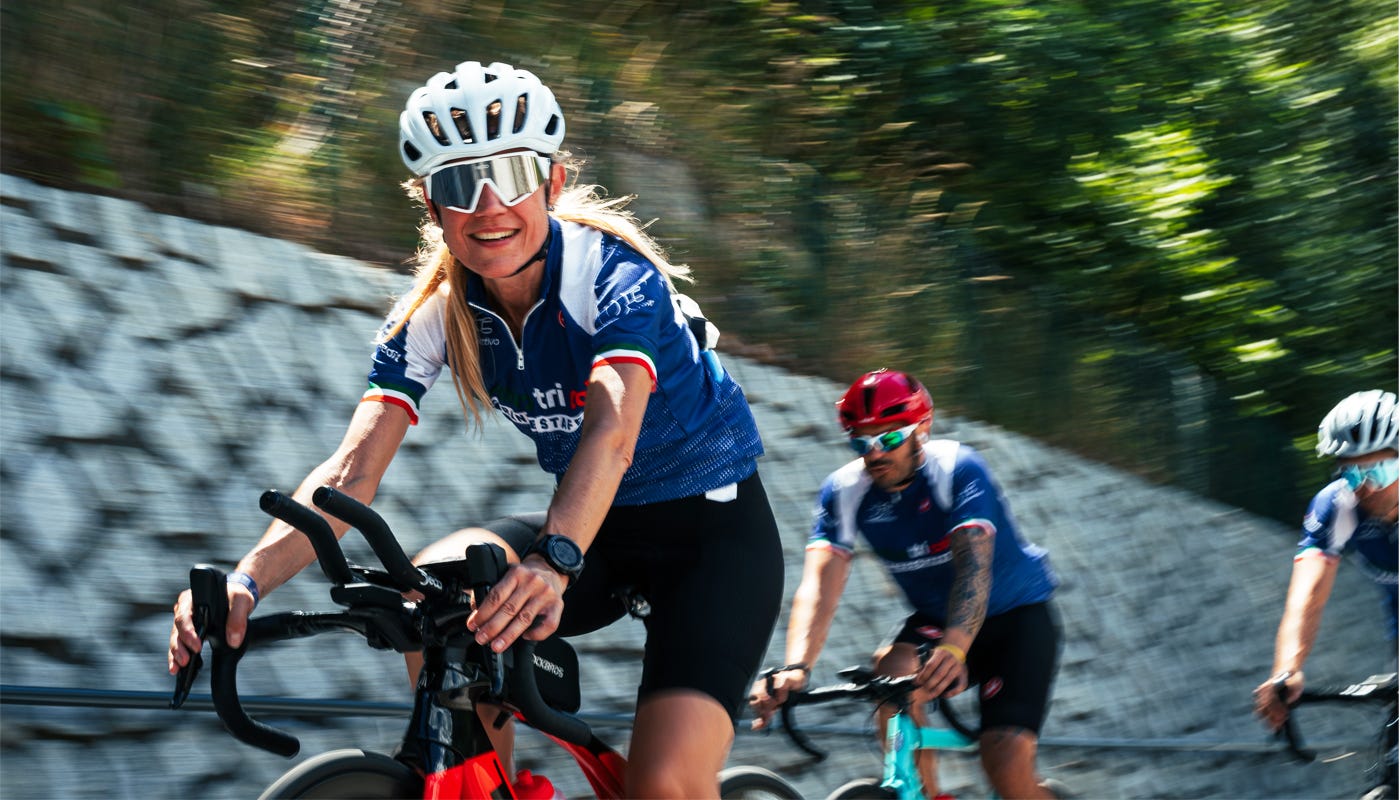"My mission is to help others go beyond prejudice"
Interview with Cristina Nuti, Obiettivo3 athlete
She’s 51, "Milanese" through and through, and the first woman in Italy and in Europe afflicted with multiple sclerosis to have completed an Ironman. The last one she took part in was the one in Hamburg, on June 5th, but she’s already working toward her next goal. On July 2nd she’ll be on the starting grid for the Maratona dles Dolomites Enel.

“When the diagnosis of multiple sclerosis was made, I was 36,” Cristina Nuti says. “It all came about in a period of just six months, and obviously it was a real blow. I started practicing sports because I wanted to prove to myself that I could be the same person as before. In fact, that maybe I could do even more than before.”
She started out on her path to becoming a professional athlete, first of all with running. Between 2017 and 2019 she took part in nine marathons, from Milan to New York to Berlin. Then came the triathlon and, despite her difficulties (when she started out, she couldn’t swim!) it was love at first sight. At age 45 she was ready to compete, but no one knew about her illness yet. Only meeting Alex Zanardi and his association, Obiettivo3, gave her the strength to break her silence.
“For eight years I lived in denial,” Cristina admits. “At first, no one knew. I was afraid of being looked at differently, through the eyes of pity. With Obiettivo3 I realized that this feeling was also hindering the longing I felt to help others. I had to overcome my own prejudice to give people hope. Today, that’s become my mission; I try to set a positive example. Each of us needs to find our personal marathon. If you try, you’ve already won, because you’ve done something you never used to think you could do.”
“When I came out of the hospital in 2008 with the diagnosis of multiple sclerosis,” she adds, “the first goal I set for myself was to start wearing high heels again. A silly thing, the kind you get attached to… I’m not even one to wear high heels, but it seemed like a really big deal, given that I couldn’t even wear slippers. I kept tripping over myself. The signals going from the floor to my brain, and vice versa, were distorted. That’s what MS does. I’d lost sensitivity on an epidermic level. I felt endless fatigue, which is really hard to explain. It’s something you can feel weighing you down, a constant that stays with you. Then there’s the pain. You get a continual burning sensation inside, like when you put your hand in snow, then pull it out and you can feel it throb. I have it all day, every day, from the waist down, like pins and needles. They’re invisible symptoms,” she says, “but they need to be talked about.”
“Athletes like me aren’t different. If anything, they have an edge,” Cristina says. “Every day we’re faced with twice the struggle: both in performance but also, and most importantly, against ourselves, to not give up. I work out every day for around two hours, but when a race is coming up, even twice a day. You need to learn to love the effort, to train it, unless it’s an effort you don’t feel that joy when you reach the finish line. Naturally for me a balanced nutrition is also really important, extra Omega 3, and attention to sport supplements during races.”
What is Cristina Nuti’s next objective?
“Moving ahead, always, because diversity doesn’t have limits, it only has new starting lines. The next race will be an opportunity to pass on this message. I’ve always wanted to take part in the Maratona dles Dolomites Enel. I want to savor every centimeter of those rises. I want to continue to be a positive role model. The fact that people ask me for advice is doing a lot for me. After the first Ironman I got a message from the father of a 13-year-old girl with my same disease. Now he’s sending me photos of his little girl who’s started to do athletics. Lots of little things are what help me understand I’m not doing this for nothing. Back in the days of my diagnosis, medical literature didn’t talk much about movement, about sports. Fortunately, I went a bit against the grain. I had the good luck, or the gift, of being determined. Maybe not everybody has it, but those who are more courageous can lend a hand to those who are more hesitant. Asking for help is an act not of weakness but of strength. Alex always told me that. And, if I can be an example for even one single person, I’ve already won.”




